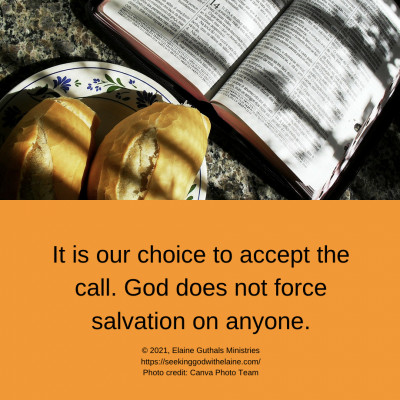There is really only one important question that we have to answer. Who do we say Jesus is? This daily devotional looks at how Peter answered that question.
Nuggets
- We each have to find the answer to the question, who do you say Jesus is?
- Jesus didn’t want the disciples to tell others that He was the Messiah because the Plan of Salvation wasn’t complete.

Jesus asked the disciples a couple of questions that were very important. Who do others say I am? Who do you say I am?
Luke’s diagnosis was we have to decide for ourselves Who Jesus is and what we are going to do about that. Let’s take a look.
Let's Put It into Context
Some pretty important things in Jesus’ ministry happened in Luke 9. The chapter began with the disciples being sent on little missionary trips to spread the gospel. A good teacher always gives His students opportunity to put what they have been learning into practice.
Jesus also fed the 5,000. This is one of His most well known miracles.
Sandwiched between these two events was a little narrative that Herod wanted to meet Jesus. He did — eventually.
A Couple of Questions
“While he was praying in private and his disciples were with him, he asked them, ‘Who do the crowds say that I am?’ They answered, ‘John the Baptist; others, Elijah; still others, that one of the ancient prophets has come back.’ ‘But you,’ he asked them, ‘who do you say that I am?’ Peter answered, ‘God’s Messiah’” (Lk. 9: 18-20 CSB)
We each have to find the answer to the question, who do you say Jesus is?
A couple of things always make me chuckle when I read this passage. Jesus was praying in private, but His disciples were there. That seems contradictory to me.
I guess it means the crowd wasn’t around — except in Jesus’ mind. He couldn’t help but not talk about them.
That is the other thing that makes me chuckle. Here Jesus finally got a well-deserved break from the throng, and He can’t forget about them.
No, Jesus wasn’t asking for the current gossip. And yes, He knew what the crowds were thinking and what their opinions were.
Glossary
If we didn’t know better, we would think Jesus’ vanity would be asking this question. We know Jesus was a meek soul. Meekness is a personality trait exhibiting a mild or moderate disposition that places dependence on God.
I think Jesus was easing into the meat of the conversation. Don’t we throw out some yes/no, closed questions before we hit someone with the open-ended questions? We have to get them softened up and thinking before we get to the deep, personal question.
Jesus could also have been getting them to take stock. He wanted them to look at all the prevailing theories and make a conscious, informed decision.
We know Jesus was using it as a building block for what He was wanting to teach them in that moment. Jones thought He wasn’t necessarily finding where they were at to form the foundation. I read that Jones thought it was a catalyst.
Resource
Let’s face it, though. Van Oosterzee not only called it a question of conscience but also a question of controversy. He was wanting them to evaluate the controversy.
Resource
Why was this question controversial? Rogers gave us a good rundown of what those other opinions were.
Rogers wrote, “So, too, in our own time is there infinite divergence among the builders who reject the chief stone of the corner. To some He is the object of a hatred which, in its malignity, would construe His good as evil — others simply pass Him by as though His claims were unworthy of serious thought — others regard Him with respect and veneration, exhaust the resources of language in their attempts to picture His moral beauty, will do anything but trust in Him as a Saviour. To some He is a man full of imperfections, ‘in consistency of goodness far below vast numbers of His unhonoured disciples,’ to others He is the perfect man, the noblest of all creatures, everything but God.”
Resource
Jesus really didn’t say they were wrong. No, He wasn’t John or Elijah. But He can mean something different to me than He does to you. I can see Him as Advocate, where you generally see Him as Healer. We are both right.
We would be wrong if we do not see Him as Messiah, the Son of God, the Savior and Redeemer of the world.

Jesus really didn’t say they were wrong. No, He wasn’t John or Elijah. But He can mean something different to me than He does to you. I can see Him as Advocate, where you generally see Him as Healer. We are both right.
We would be wrong if we do not see Him as Messiah, the Son of God, the Savior and Redeemer of the world.
I love how Peter just popped up and said, basically, “You are the Christ.” It may have been because Peter was the spokesman of the disciples. Maybe it was because Peter was impulsive.
I like to think Peter just blurted out the answer because he was confident it was the right answer. He saw Jesus as Messiah, the Son of God, the Savior and Redeemer of the world.
Jesus wasn’t just the carpenter’s son from Nazareth. He wasn’t just a prophet.
He was the Son of God, Whom God has made the Messiah.
Where did Peter get that answer? It definitely wasn’t the worldview at the time. Jesus’ first question solidified that.
Luke didn’t tell us, but Matthew did. “Jesus responded, “Blessed are you, Simon son of Jonah, because flesh and blood did not reveal this to you, but my Father in heaven” (Mt. 16: 17 CSB).
It came from Peter’s relationship with Jesus. Peter answered in faith. Faith is the conviction that the doctrines revealed in God’s Word are true, even if we do not understand all aspects of them, a belief which impacts our lives.
Yes, there is that R word again. It is a personal faith that strengthens our relationship with Jesus. If we strengthen our relationship with Jesus, we strengthen our relationship with God.
And there is that blessed word again. Blessedness means perfected. The perfected state indicates the combination of the graces which, when all are present, form spiritual wholeness or completeness.
Peter had ABCDed. God had called him to salvation.
To read a related devotion, click the button below.
The ABCDs of Salvation
If you have not become a believer in Christ, please read through the
Plan of Salvation and prayerfully consider what God is asking you to do.
A – admit our sins
B – believe His Son Jesus is our Redeemer
C – confess God as Sovereign Lord
D – demonstrate that commitment by making any changes needed in our lives to
live the way in which God has called us
The Disciple’s Job Description
Yes, God has to call us to salvation. He calls everyone. “This is good, and it pleases God our Savior, who wants everyone to be saved and to come to the knowledge of the truth” (I Tim. 2: 3-4 CSB).
But it is our choice to accept the call. God does not force salvation on anyone.

The Don’t Tell Instruction
“But he strictly warned and instructed them to tell this to no one, saying, ‘It is necessary that the Son of Man suffer many things and be rejected by the elders, chief priests, and scribes, be killed, and be raised the third day’” (Lk. 9: 21-22 CSB)
Jesus didn’t want the disciples to tell others that He was the Messiah because the Plan of Salvation wasn’t complete.
It always amazes me that Jesus told the disciples not to tell anyone that He was the Messiah. Jay reminded us of two things:
• “‘For my thoughts are not your thoughts, and your ways are not my ways.’ This is the Lord’s declaration” (Isa. 55: 8 CSB).
• “There is an occasion for everything, and a time for every activity under heaven” (Ecc. 3: 1 CSB).
Resource
Jesus followed through with the humiliation of the cross because He loves us. Once He had risen and had ascended, then the disciples could shout it from the rooftops. Jesus is alive!

Making the Connections
Our knowing Jesus is not based on what our mom’s relationship with Him. Same with our dads. Grandma may have prayed every day for our spiritual condition.
The relationship others have with Jesus aren’t the deciding factor in our relationship with Him.
How Do We Apply This?
Luke’s prescription is that we, too have to answer as Peter did — You are the Christ.
Jay kind of flipped the question around, though. He asked, “Who does God think we are?” What does God say of us?
Resource
Oh, that is a jolt! Some days, we might think God would say we are an obedient child. Other days, we know He would not be pleased with us.
We have to live like God calls us to.
Father God. We stand and say Jesus is the Christ, the Messiah, the Son of God. We will tell others what Jesus did and what You mean to us. Give us boldness. Amen.
What do you think?
Leave me a comment below (about this or anything else) or head over to my Facebook group for some interactive discussion.
If you don’t understand something and would like further clarification, please contact me.
If you have not signed up for the email daily or weekly providing the link to the devotions and the newsletter, do so below.
If God has used this devotion to speak with you, consider sharing it on social media.
Pingback: What Should We Do about Who Jesus Is? – Seeking God with Elaine
Pingback: Losing or Saving Our Lives – Seeking God with Elaine